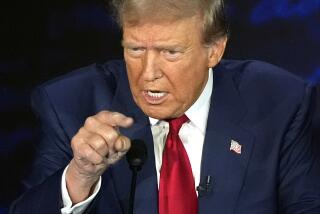Unions need to give the public a break
Reporting from Sacramento — Even in deep blue California, where Democrats dominate, organized labor is losing public popularity.
That’s a general statement, based on nonpartisan polling.
Specifically, public employee unions are tarnishing all labor, according to the pollster.
He pinpoints pension envy: public employees pulling down generous retirement benefits that private sector taxpayers began losing years ago. That’s the long-term public gripe.
And recently in the traditional labor stronghold of the San Francisco Bay Area, voters have especially soured on unions because of two very annoying public transit strikes.
“When voters are thinking about labor, they’re by and large thinking about public employees,” says Mark DiCamillo, director of the Field Poll. Government workers “have a certain amount of negative drag to them.”
“Voters have been hearing about local government services being cut because of pension obligations, and that rubs them the wrong way.”
That’s compounded in the Bay Area — “ground zero for labor support,” he says — by rail transit strikes.
A Field Poll released last week reported that voter views of labor unions statewide “have taken a decidedly negative turn over the past 21/2 years.... There has been a net 16-point swing in voter sentiment from the positive to negative side.”
Voters were asked whether they thought labor unions do more harm than good, or vice versa. The response was negative: 45% more harm, 40% more good. But in March 2011, the outcome was the opposite: 46% good, 35% harm.
Queried about public employee unions specifically, 44% said they caused more harm, 39% more good. That’s roughly the same finding as for all unions, and the pollster theorized voters were lumping public and private together.
Of California’s nearly 2.7 million union members, 56% are public employees and 44% work in private enterprise.
In the Bay Area, voter attitudes about unions are still slightly positive: 45% to 41%. But in 2011 they were overwhelmingly upbeat: 50% to 30%.
There has been a striking deterioration in labor’s popularity since Gov. Jerry Brown was governor the first time, back in the 1970s. Brown was the guy who empowered public employee unions by granting them collective bargaining rights.
In 1977, the Field Poll found that 51% of voters thought unions did more good than harm. Only 34% figured more harm.
My eyes really opened when I read what longtime labor supporter Willie Brown had to say in his weekly column Sunday in the San Francisco Chronicle.
“Today’s unions are not bucket lunchers,” wrote the former state Assembly speaker and San Francisco mayor, who now consults on how to influence politicians. “In fact, many of today’s union members work for the government, which isn’t the greatest place to engender goodwill with the public.”
“Clearly,” Brown continued, “public employee unions need to adjust their tactics. They can’t pretend they’re the 21st Century descendants of John L. Lewis, fighting to keep management from forcing them into indentured servitude....
“Public employees need to pull back from attacking management and start acting more like they work for the public.”
But Brown predicted there’s “not much chance” of transit workers being prohibited from striking — as state Senate Republican Leader Robert Huff of Diamond Bar advocates — because “public unions still have clout in Sacramento, thanks to their campaign contributions.”
No question, labor is the most powerful interest in Sacramento. Little gets done over its objection, especially in an election year.
State and local public employee unions donated $2.7 million to legislative candidates during the 2012 elections, according to MapLight, a nonpartisan outfit that tracks political money. Police and fire unions also contributed about $2.7 million. Teachers unions kicked in $1.6 million. And the teachers pumped roughly $16 million into Brown’s tax increase initiative.
Unions “continue to have this great power in getting their way,” DiCamillo says. “They’re still winning most of their battles, but in terms of the public, they may be losing the war.”
Based on voter sentiment, 2014 might be a good time to place a public pension reform initiative on the ballot. San Jose Mayor Chuck Reed is trying. He has drafted an initiative that would allow public agencies to negotiate reduced retirement benefits based on future work, but allow employees to keep the pensions already earned.
Last year, voters in San Jose and San Diego adopted pension reform plans by landslide margins.
“Cities all over the state are seeing services crowded out so they can pay for retirement costs,” Reed told me. “Retirement costs have gone up and services have been squeezed. That’s unsustainable.”
Reed is waiting for the state attorney general to write an official title and summary for his proposal. Then he’ll decide whether to circulate the measure for voter signatures to place it on the ballot.
Based on her past performance, Democratic Atty. Gen. Kamala D. Harris won’t be doing Reed any favors in summarizing his measure for the public. Her wording may read like union propaganda.
Steve Smith, communications director for the California Labor Federation, says that public employees “are being scapegoated. There’s no getting around the fact that many cities have mismanaged finances.”
No question. And included in the mismanagement is promising employees retirements that the cities — and counties and special districts — can’t afford.
When Californians turn against organized labor, that should be a clue for unions and their pet politicians to ease up on taxpayers and transit riders.
More to Read
Sign up for Essential California
The most important California stories and recommendations in your inbox every morning.
You may occasionally receive promotional content from the Los Angeles Times.











